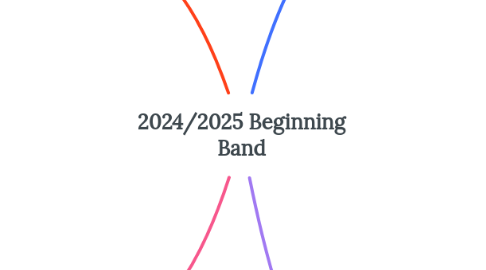
1. Quarter 3
1.1. Unit 7: Time to Go Low
1.1.1. Next notes (low G, low A)
1.1.2. Time Signatures (2/4, 3/4, 2/2)
1.1.3. Concert G Minor Scale, Concert G Minor Pentatonic Scale
1.1.4. Second compositions
1.2. Unit 8: Hold on
1.2.1. Developing Long Tones
1.2.2. Small Group Playing
1.3. Unit 9: Third Concert in Harmony
1.3.1. Basic Harmonic Analysis
1.3.2. Third Concert
2. Quarter 4
2.1. Unit 10: Last Notes
2.1.1. New Notes (C', A Flat, E Natural)
2.1.2. Key Signatures Revisited
2.1.3. Solo Playing
2.2. Unit 11: Advanced Rhythms
2.2.1. Sixteenth Notes, Syncopation
2.2.2. Triple Meter (6/8, 9/8, 12/8)
2.3. Unit 12: Transition to Mentor
2.3.1. Basic Conducting Skills
2.3.2. Finding a Friend
2.3.3. Fourth Concert
3. Quarter 1
3.1. Unit 1: Intro and Basics
3.1.1. Instrument assembly, care
3.1.2. Embouchure and basic tones
3.1.3. First 3 notes (Bb, C, D)
3.1.4. Ensemble skills and norms
3.1.5. Rote rhythmic echoes
3.2. Unit 2: Rhythmic Foundations
3.2.1. Basic Rhythm Reading/Composition
3.2.2. Unison ensemble playing
3.2.3. Next 2 Notes (Eb, F)
3.3. Unit 3: First Performance
3.3.1. Basic Staff Reading
3.3.2. Tutti Section Playing
3.3.3. Performance ettiquette for first concert
3.3.4. 6th Note (G)
4. Quarter 2
4.1. Unit 4: Moving in Harmony
4.1.1. First Compositions
4.1.2. Playing in harmony
4.1.3. Half Notes, Whole Notes, Eighth Notes
4.2. Unit 5: Study in Contrasts
4.2.1. Dynamics (piano to forte)
4.2.2. Basic Articulations (stacatto and legato)
4.2.3. Last two notes (A, Bb')
4.3. Unit 6: Scales and 2nd Performance
4.3.1. Concert Bb Major scale
4.3.2. Concert Bb Pentatonic scale
4.3.3. Second Concert
